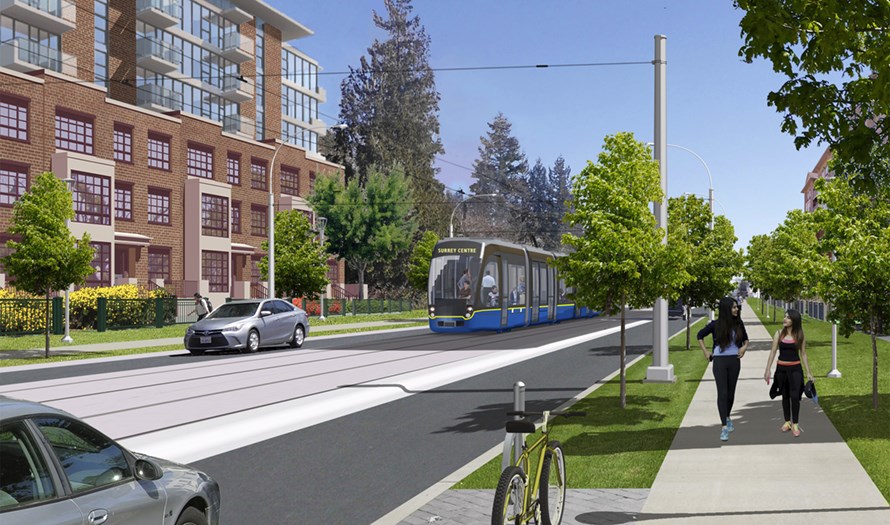Surrey is the fastest-growing metro centre in B.C., and its young population â 22 per cent of B.C. births are now in Surrey â is gunning to claim the title of the provinceâs biggest city within a generation.
The population gap between Surrey and Â鶹´«Ã½Ó³»will narrow to 100,000 people within three years and will be non-existent by 2040, according to a report Michael Heeney, president and CEO of the Surrey City Development Corp. (SCDC), presented September 13 at an event sponsored by the Real Estate Institute of British Columbia.
The pace could be even quicker, based on the number of people moving south across the Fraser River to find work and affordable housing in the city of 518,000. The SCDC study showed that Surrey posted an 11 per cent population growth between 2011 and 2016, compared with 6.5 per cent in Â鶹´«Ã½Ó³»and 6 per cent in Metro Vancouver. In the same period, Surreyâs employment growth was 51 per cent, compared with 7.2 per cent in Metro Vancouver.
The home price gap is just as revealing. In August, for instance, 229 detached houses were listed for sale in Surrey-Delta for $1 million or less, compared with just one in Vancouver. There were two-dozen in North Surrey alone, according to data from the Fraser Valley Real Estate Board.
The typical Surrey condo apartment sells for $340,000 compared with $846,100 in Greater Vancouver.Â
Yet average family incomes in Surrey are higher than in B.C.âs biggest city, reports Statistics Canada.Â
âSurrey is the future,â said Surrey developer Charan Sethi, president of Tien Sher, who has built and sold out half a dozen low-rise condominium projects in and around Surrey Centre.Â
Sethi is now pulling together plans and permits for the redevelopment of the former Flamingo hotel site into Tien Sherâs first highrise residential project.Â
Bigger players also have expansive plans for the city.
Walmart Canada will spend $175 million to build a 300,000-square-foot fulfilment centre in Surreyâs Campbell Heights Business Park, the giant retailer has announced. It will be part of a national plan by Walmart to offer home delivery of groceries.Â
The future Surrey distribution centre will have space for frozen foods and produce as well as for shelf-stable groceries and other products. Walmart expects the centre will be operational by 2022. Construction will begin early in 2021. The site will employ between 150 and 200 people.
Walmartâs competition in the online-sales space is indisputably mega-retailer Amazon.com Inc., which already has two large distribution centres in Metro Vancouver, including one in Delta.
Walmart said its future Surrey site would deliver fresh produce and frozen grocery products to 60 Walmart locations across the province.
It also touted its future Surrey site for being âzero-wasteâ and having many sustainability features. Outgoing Surrey Mayor Linda Hepner praised the buildingâs sustainable design as a ânovel, forward-thinking approach.â
Industrial strength
The selection of Surrey for a massive new distribution centre comes as no surprise to industrial real estate professionals on both sides of the Fraser River.
âSurrey has the greatest amount of industrial space under construction in Metro Vancouver, at approximately 1.05 million square feet,â noted Andrew Rojek, manager of market intelligence, Western Canada, for Colliers International.
Even with the boom in building, Surreyâs industrial vacancy rate is 1.2 per cent and its average industrial lease rate is $9.14 per square foot, both among the lowest in Metro Vancouver.
A recent report from the Â鶹´«Ã½Ó³»Economic Commission recognized the industrial power shift that is transferring investment, and jobs, south of the river.
A squeeze on industrial space means 10 per cent of industrial businesses in Â鶹´«Ã½Ó³»plan to relocate in the next two years, the commission found. This equates to the loss of 6,000 jobs.Â
A further 40 per cent of industrial businesses are thinking about moving out of Â鶹´«Ã½Ó³»by 2020 due to the cost of doing business in the city and the difficulty of finding workers, according to Pietra Basilij, a sustainable community development specialist with the commission and the reportâs author.
Companies leaving Â鶹´«Ã½Ó³»head for Delta, Surrey and Langley, Basilij said.Â
²Ñ³Ü±ô³Ù¾±-´Ú²¹³¾¾±±ô²âÌý
In September, Prime Minister Justin Trudeau visited Surrey to confirm federal funding for the Surrey-Newton-Guildford light-rail transit (LRT) line. The $1.65 billion line will run 10.5 kilometres along King George Avenue and 104th Street to link Newton with the Surrey Central transit station.Â
The transit link has created a development buzz in Newton because higher-density residential zoning will be allowed. But the planned route has been known for years, and some investors say the gravy train has already left the station.Â
The cost of an acre of residential land in Surrey hit $3.1 million this year, according to Colliers, up from $2 million in 2016. In the Newton area, residential land sells for $4 million to $5 million per acre, estimates land specialist Joe Varing, director of sales for Varing Marketing Group.Â
âI plead with everyone, âfind me two to five acresâ in Newtonâ,â Sethi joked, but he suggested land speculation has driven the prices too high for smaller multi-family developers. Still, he thinks the LRT is âpivotalâ to the growth of Surreyâs downtown.Â
Rental investors see fast-growing Surrey as a prime market. Giant landlord Mainstreet Equity Corp. of Calgary, for example, has been buying older apartment buildings in Surrey for years and now holds 1,775 rental units in the city.Â
Even with a 21 per cent increase in the past year, the average price of a Surrey rental apartment building now averages $206,000 per suite compared with $586,000 in Â鶹´«Ã½Ó³»and nearly $500,000 across Metro Vancouver, according to the Goodman Report from HQ Commercial.
Surreyâs rental vacancy rate is less than 1 per cent, similar to Vancouver. Surrey rents are lower than in Greater Vancouver, but the average capitalization rates on apartment buildings are higher, at around 4 per cent, according to HQ.



